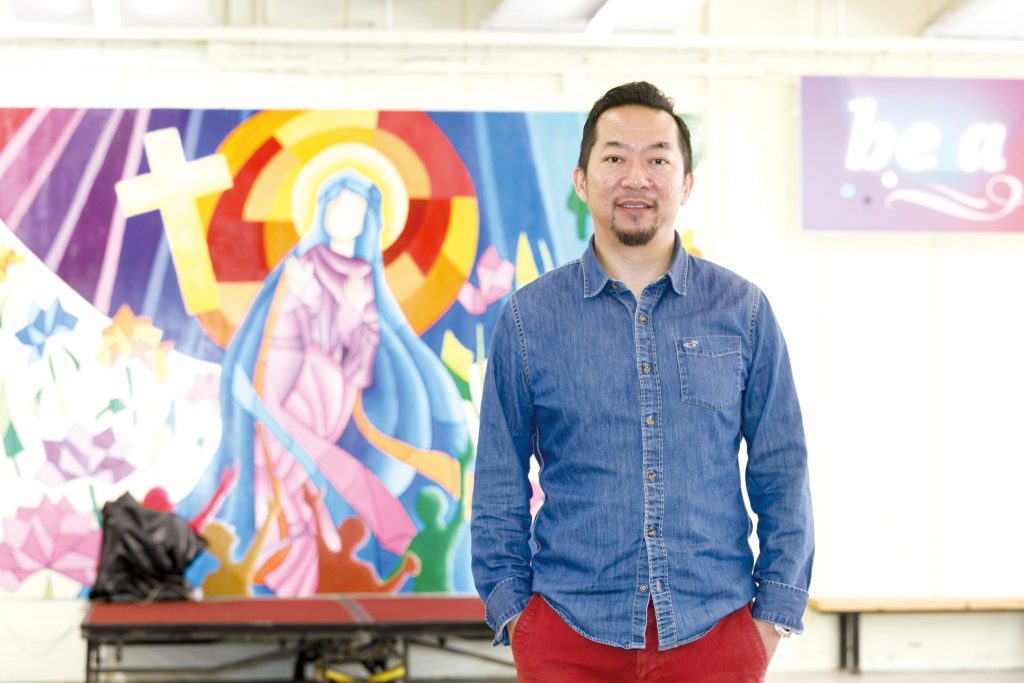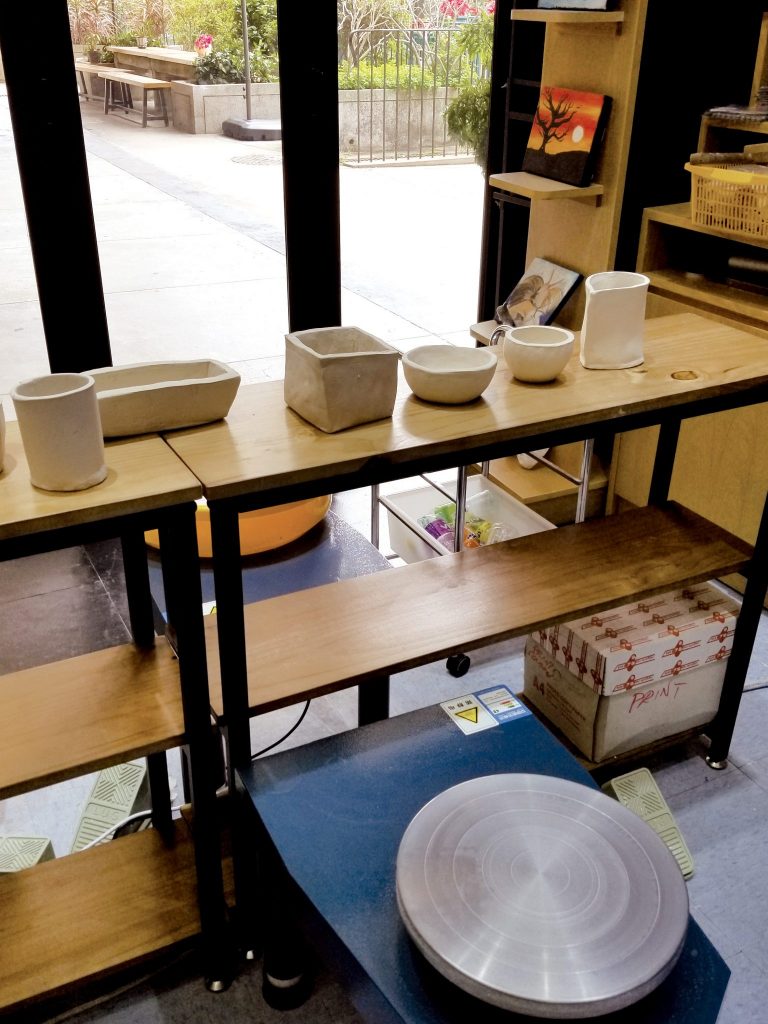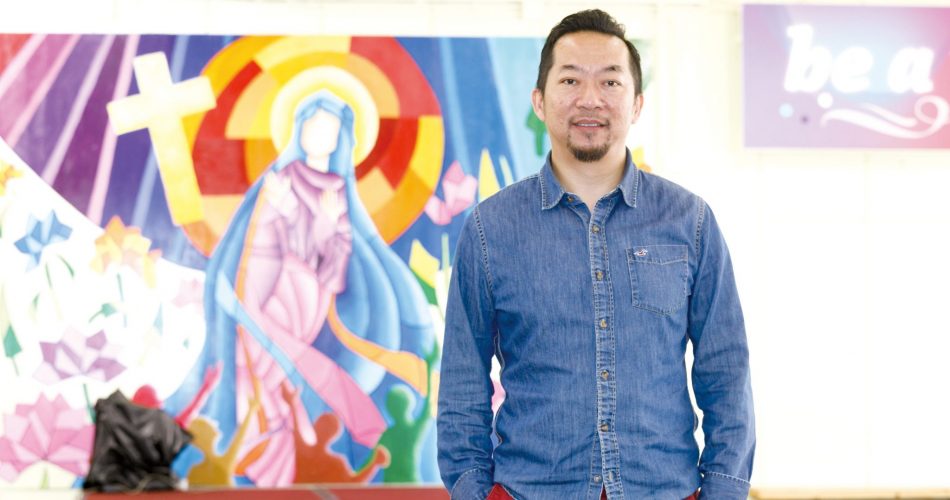
During my visit to Salesians of Don Bosco Ng Siu Mui Secondary School, I could not help but smile when I was handed Principal Li’s business card. In fact, every teacher’s business card features a student’s artwork. Principal Li explained, “We believe every student has unique talents that are worth celebrating, yet the Hong Kong education system only focuses on one – academic performance. We want to reinforce the message that we believe in our students and their abilities. On top of allowing their talents to flourish, boosting their self-confidence is also important. For instance, the student who drew this cartoon portrait on my business card has special educational needs. If he had been enrolled in another school, he might have been silent, withdrawn or even bullied. However, he has become a lot more cheerful after just six months of studying in our school. It is a pity for talented children to look down on themselves because of others’ judgements. They need approval and appreciation.”

Upon graduating with a degree in social work, Principal Li started his career in outreach and came to the realization that teenage dropouts and expelled students do enjoy learning. Yet, assumptions such as “the teachers are bad” or “the school has given up on me” became reasons why they stopped going to school. Principal Li stated, “I believe education is a crucial element of change, which is why I became a teacher to help these teenagers before they leave the education system. I began teaching at one of the lowest ranked band-five schools, in which every student was prone to behavioural problems or learning difficulties. After careful observation, I must admit teachers may develop blind spots working overtime for long periods of time. I want to inspire them to better value students’ unique talents. I have been in the education sector since then and have never changed my aspiration to nurture teenagers.”

This has been an especially challenging year for the education sector. As adults, how can we understand and support teenagers? Principal Li shared his insights, “A humble attitude is essential to understanding teenagers. We often assume we have been through so much that we understand teenagers’ every idea and emotion. This kind of mindset can lead to development of blind spots. In this new era, we must remind ourselves of our shortcomings and stay humble. If we genuinely believe this, we would not appear to children as arrogant, authoritative adults who only want to force our opinions onto them. We also need to walk our talk by learning to listen. In English, hearing and listening are distinctive – hearing does not necessarily mean that we have listened. Listening requires patience and no judgement. While everyone is entitled to their own opinion, we should not just express ours. All parents love and wish for the best for their children, but even the best intentions might not be enough. If our methods are wrong, the results may fall far from our expectation. Parents scold to prompt children’s improvement, but often do not get what they want and may even wound their children. Listening is easier said than done. It is not enough for the parents to listen, but the children must feel that they have been heard, which takes prolonged practice. Parents must not be afraid of rejection and must never give up on initiating communication. Listening goes past your ears but takes place in your heart. Children’s written words, behaviours and facial expressions are clues to what is going on in their heads. Parents’ observations are paramount during critical time. If they notice something wrong with their children but cannot get verbal answers out of them, observation already serves as a means of listening.”

“Timing is also crucial. There are cases in which parents cared for their children but the timing and method were wrong. Not only did the children fail to feel loved, but they also regarded their parents annoying. Teenagers, especially boys (Salesians of Don Bosco Ng Siu Mui Secondary School is an all-boys school), have very limited vocabulary to verbally express their feelings. A simple ‘OK’ may imply happiness, sadness, excitement, gratitude, disappointment if not more. Despite teenagers’ inability to express emotions, they secretly wish adults could understand what they are thinking. Is it difficult? Yes. Does it take a lot of work? Yes. Will parents encounter failures? Yes. Being a parent is extremely tough and unfair. A tip of the hat to every parent out there!”



“Every parent-child relationship is different so expression of concerns comes in myriad ways. Salesians of Don Bosco was established by Italian priest John Bosco more than a hundred years ago when he took on the responsibility to take care of a group of street kids. He once said, ‘You must like what he likes for him to be interested in what you like.’ It means you must first understand your child’s interest to close the gap between you two. Then, try to get your child to be interested in what interests you – which for us educators, is for children to live more positively and thrive. There are numerous ways to show your love, as simple as cooking a bowl of noodles for your child. He/She may not appreciate it at first, but success is within reach when you have patience. Some parents may say, ‘I already cook breakfast and dinner for my children every day.’ In that case, why not prepare your children’s favourite dish once in a while, or make their favourite snacks for them when they feel down? They will get the message that their parents do understand them!”

“There is a saying in English: Actions speak louder than words. While actions are important, the wrong ones are worse than no action at all. For example, a parent was very concerned about her son as he had just started secondary school, so she stood in front of his school to catch potential bad apples among his friends. Her actions embarrassed her teenage son at a time when he was self-conscious, as well as seeking and affirming his identity, which may push him away from her. Therefore, before you listen, ask yourself whether you are willing to learn and bond with your child. A lot of parents have complained about their children’s ungratefulness as they try their best to provide them with things they never had at their age such as afterschool tutorials and piano classes. Yet, children never experienced parents’ childhood and would not understand the hardships that they had growing up. On another note, despite the current ubiquity of Zoom, I never thought it could be used for academic purposes. Yet, teenagers nowadays pick up on new technologies with such ease, what can we do then? Learn with them humbly.”
Many parents ask whether parent-child relationships could be repaired. Principal Li gave parents confidence, “My answer is yes! All parents love their children. If the parent-child relationship has turned sour, even broken, parents should learn to love themselves first. Not many people would remind parents to love themselves, but, with a broken heart, one will not have the energy to move forward. Fathers and mothers should love each other so they have the capacity to love their children. Solutions can only be derived when your heart and brain are at ease. Many people seek help because they want to get quick fixes from the expert; some of them even want the expert to solve the problem for them. The reality is: it does not work this way. It is a cycle: if parents do not put in the effort, the problem will come back to haunt them as their children grow up. It is not uncommon to come across the following in a secondary school – students are fine in Form One, problems arise in Form Two, worsen in Form Three, and then magically disappear in Form Four and Five. This marks a common pattern as teenagers search for their identity. Students in kindergarten and primary school always ask adults ‘why’. For secondary school students, the question becomes ‘why not’ – this is not their attempt of talking back but a sign of cognitive shift as beliefs shape in their heads. In the first 12 years, they would listen to you even when you reduce the explanation into a command (i.e. ‘because I said so’). However, when they are older and want to understand the real explanation behind their ‘why nots’, your simple or lack of response may lead to conflicts.”

“For instance, when a child questions his/her father as to why he is allowed to stay up late to watch football games while he/she must go to sleep, the answer ‘because children need more rest than adults’ can only satisfy them up to the age of Primary Six, after which, his/her further questioning would seem like he/she is talking back. Vice versa, the child in this example may think the father is being unreasonable, thus halting parent-child communication. As such, the child would turn to the Internet and the people he/she meets there as his/her authority or mentors instead, further plummeting the parent-child relationship. This, undoubtedly, saddens parents. Why do I say parents should love themselves? When parenting mindsets and techniques are under your command, you must have the right passion and energy to make the right choices. Lack of self-love will result in negative emotions and stress, making you prone to anxiety and renouncement. During heated conversations with children, you may be inclined to throw your hands up and say, ‘Then forget it!’ – these words are irretrievable yet are maintained due to adults’ meaningless sense of pride. When anger arise, try to love yourself to avoid saying things you cannot take back. Although your child is naughty and disobedient, you can tell yourself that you can solve the problem. You have the capacity to take on the foul attitudes without rebuking with equally poor responses that will damage the relationship. Then, please listen to yourself and ask whether it is a good timing to teach your child when you are not in a calm mood. Do not hesitate to reach out for help from social workers, counsellors and teachers in school, but do not aim at getting a quick fix. Before answering your child, decide what kind of attitudes and values you want to instill? Do you want him/her to have a healthy lifestyle and sleep earlier? Your actions speak louder than words! If your actions and words are not in sync, how can you convince your child? Of course, you can say, ‘I want to watch the football match because it is my hobby and it is my choice.’ However, you have to keep in mind the impact such incongruences have on your child. You are the father, so of course you have the authority over your child’s actions, but you would be conveying the message that ‘adults need not honour their principles and I can do whatever I want when I grow up’. Some children may wait until 15 or 16 years old to do as they wish while some may rebel against their parents immediately. Therefore, parents do not need to teach, but only to act accordingly, which, in this case, is avoiding switching on the TV late at night. Is it a kind of sacrifice? Yes, it is. But think about what you want to achieve at the end. This is your choice.”


Last November, protestors occupied The Hong Kong Polytechnic University. Principal Li was one of the secondary school principals who entered the university to bring students out. Although his students were not there, he still went back to the university day after day to help persuade other students there to leave and ease the tension on campus. While everyone in Hong Kong has suffered from the Anti-Extradition Bill Movement, Principal Li believes that one of the ways to ease young people’s thoughts and emotions is through understanding and communication. “We have held meetings to listen to voices of different stances. In the first meeting, teenagers from the valiant crusaders and the peaceful talkers were invited to express their views. Medical staff and frontline social workers were invited to do sharing in the second meeting, lawyers in the third, journalists in the fourth and police in the fifth. Everyone should listen to the voices of different stakeholders, especially that of teenagers. One of my students who had been on the frontline since the beginning of the movement was going to study overseas. Before he left Hong Kong in dismay, I caught up with him to see what I could do for him. I was grieved at his words. He hoped more people could listen to the teenagers’ voices even though they might not agree with them as the act of listening itself is already a form of support. I want to bring forth a message through these meetings – pointing fingers will not help teenagers change or improve. I do not support any illegal behaviour, but we must figure out what has driven them to break the law. These are people that will grow up and continue to stay in Hong Kong, so what lies ahead in their future? As educators, not law enforcers, we would focus on teaching, not punishing them. Of course, taking responsibility for one’s action is also one of the lessons. What else can we do? This issue impacts one whole generation. Punishmentsare easy, but listening is crucial.”

During class suspension, teachers of Salesians of Don Bosco Ng Siu Mui Secondary School are busier than ever. Besides preparing special teaching materials, they also have to follow up on students’ conditions every day by phone. Principal Li said, “The worthiness of educators is most proven at difficult times. Teachers have the ability to instill positivity in students. Although the outbreak of COVID-19 led to class suspension and hindered learning progress, it is, however, an invaluable moment to teach students to remain thankful. At the same time, this is an opportunity for us to review some deep-rooted concepts and conventions. Many parents regard examinations as a matter of utmost importance. Yet, it is far less important than health as examinations can be postponed or cancelled. Adversity is a time for us to appreciate what is the most important in life.”

Epilogue
“We are grateful for teachers prioritizing students out of our shared belief rather than the Principal’s order. In fact, if we had shared this belief only after the outbreak, the efficiency would have been different. Students have always been our top priority, not just during this outbreak. We care for them. We want to build a positive relationship with them. We can then convey knowledge, beliefs and values, as well as overcome difficulties together.”
Photo Credit (partial) : Salesians of Don Bosco Ng Siu Mui Secondary School

